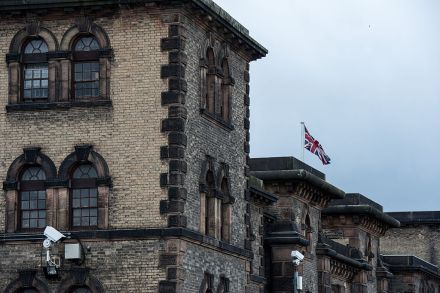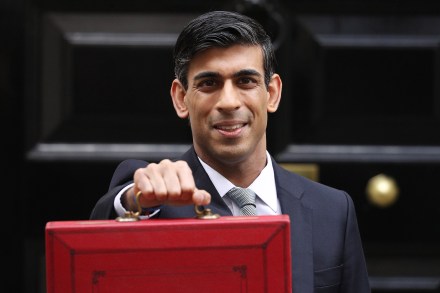What does coronavirus mean for Britain’s prisons?
21 min listen

Read about the latest UK political news, views and analysis.
21 min listen

When we left this Britain on Thursday last week, life was almost as usual. Shops and restaurants were open. The Battle Observer was reporting that environmentalists, angry that East Sussex County Council’s pension funds are invested in fossil fuels, were organising a one-day protest demanding a ‘sex strike’. No one, they insisted, must have sexual intercourse with any of the county’s 50 elected councillors ‘until they agree to stop funding climate change’. As a campaign, this latter-day reworking of Lysistrata had the merit that most people would probably agree to its conditions, whatever their views on climate change. We returned home on Monday, however, to read that the protest had

As every Chancellor knows, behind every figure in the Treasury lie thousands of human stories. At times like these, saving lives is the first, unmitigated priority. This means releasing whatever resources the NHS requires. Hospitality, retail, the self-employed: otherwise healthy enterprises of every description are facing an existential threat. Supporting businesses with government-backed loans is a good start, but it won’t be enough. Temporary tax cuts are also needed: ‘No need to pay’ rather than ‘Time to pay’. If we want the economy to surge back once the danger has passed, these measures will need to be rolled out soon and at top speed. The economic package thus far is

The Labour leadership contest has been going on for so long that two of its candidates, Lisa Nandy and Rebecca Long-Bailey, have taken to counting down the hours they have left. The race to succeed Jeremy Corbyn started in early January, and will finally finish on 4 April. When we meet, Nandy is feeling run-down — not because of coronavirus, but the sheer length of a contest that she had initially thought should run beyond May’s now-cancelled local elections. She regrets calling for that now. A long contest should have helped the Wigan MP. When it started, she was not as well-known as the other candidates, and needed time to

In some ways, it’s easy and even important to keep Rishi Sunak’s performance in announcing his coronavirus job retention scheme in perspective. It should, after all, be pretty easy to be popular in politics when you are offering to spend literally limitless amounts of money protecting people from economic hardship. A cynic would also say that it’s relatively easy to look grave and statesmanlike when you’re standing next to a prime minister who can still look more inclined to play Prince Hal than Henry V. But even taking those things into account, I still consider Sunak’s performance one of the most impressive I’ve seen from a British politician in more

In his third Covid bailout in just over a week, Chancellor Riski Sunak has shifted his focus from businesses to employees with an unprecedented three-month commitment to cover the bulk of pay for workers facing redundancy. He’ll cover up to 80 per cent of all salaried workers’ wages (up to £2,500 per month, around the UK’s medium income). This is a blanket pledge, an unprecedented intervention on the part of the government that will see the state pay private businesses – big and small – to retain their employees for the foreseeable future. The ‘Job Retentions Scheme’ is not targeted specifically at vulnerable sectors – presumably because any targeted scheme requires some form of means testing,

13 min listen

At least no one can say it isn’t bold. The United States is fiddling around with some possible cuts to payroll taxes. Most of Europe is stuck with some printed money from the ECB. But the UK is embarking on one of the most radical experiments in modern economic theory, and one that will no doubt be studied for decades to come. With his latest announcement today, a whole 48 hours after his last intervention, the Chancellor Rishi Sunak has effectively turned the UK into a wartime economy. This is the most extensive intervention in the economy ever made by a supposedly free market government anywhere in the world The

Boris Johnson has announced this evening that pubs and restaurants must close as of this evening. After beginning the week by telling the public they should avoid such venues, the Prime Minister has now instructed these establishments to close their doors: ‘We are collectively telling cafes, pubs, bars and restaurants to close tonight as soon as they reasonably can and not to open tomorrow – thought to be clear they can continue to provide takeout services. We’re also telling nightclubs, theatres, cinemas, gyms and leisure centres to close.’ Johnson was clear in his comments that this was a decision his government had not taken lightly – and one that he


Britain is midway through a deep recession: of that there is no doubt. But what next? Oxford Economics has today been one of the first to offer an answer, predicting a V-shaped economic recovery (sharp economic downturn and sharp economic revival) and near-complete economic repair. It is, of course, a guess: all forecasts are. But it’s one worth looking into in a bit more detail. All published economic forecasts pre-Covid-19 (including those accompanying the Chancellor’s Budget last week) are defunct, so this is an early test – one that factors in the Government’s policy of ‘social distancing’ and the profound impact this has on business as usual. Oxford Economics has

Every weekday afternoon a professional Twitter mob gathers to give a running commentary on the Prime Minister’s daily coronavirus press conference. Its leading lights will critique Boris Johnson’s every utterance to see what might catch on. Perhaps it will be a snarky comment about how modified advice in the light of new data really shows that he was all at sea before. Or not across the detail. Or his failure to be able to guarantee when this will all be over might be deemed disgraceful. Maybe Alastair Campbell will throw in a grenade about allegedly confused messaging. Or Piers Morgan will issue a ‘bloody well do something or we are

If Brexit did not do it, the panic buying has trampled to death national myths patriots once cherished. We now see that ‘quintessentially English’ does not now mean a reserved character with a stiff upper lip joining an orderly queue. But a demonically possessed shopper lunging towards the last four-pack of loo roll. Conservatives can find one comfort, however: the crisis is upholding their view of human nature – or at least it appears to be. Covid-19 is giving life to Margaret Thatcher’s sociological analysis. ‘There’s no such thing as society. There are individual men and women and there are families. And no government can do anything except through people,

It’s very interesting, and important, that the Bank of England is encouraging banks to turn half a blind eye to likely coronavirus losses on loans to businesses and mortgage borrowers – in the hope that banks don’t suddenly stop lending for fear future losses will deplete their capital. After the 2008 banking crisis, this is something I never thought I would see, but it’s probably an appropriate measure. Given the sheer number of businesses and mortgage-borrowers in trouble, the damage to the economy would be made much worse if banks stopped or cut lending for prudential reasons. What matters is that the Bank had better be right that the economy and businesses will

The coronavirus epidemic storming the world is far more frightening than the bank crisis over a decade ago. It not only poses a risk to people’s health, but if left to fester could tank economies and cause unbearable financial strains for millions. But in the United States, the country’s divided congress could – as it has done before in times of crisis – hinder rather than help the rescue effort. Republican and Democratic lawmakers in Washington are, for now, at least, saying all of the right things to their constituents, some of whom have family members or friends infected by Covid-19 and quarantined from the general public. Majority leader Mitch McConnell and minority

37 min listen
Emily Thornberry is the shadow Foreign Secretary and former contender for the Labour leadership. On the podcast, she talks to Katy about her challenging childhood, what practising law taught her about politics, and her bid to succeed Jeremy Corbyn.
The announcement today by Boris Johnson that we are gearing up Covid-19 testing from 5,000 a day, to 10,000, to 25,000 to 250,000, and the endorsement from the government’s chief scientific adviser Sir Patrick Vallance that this could theoretically happen in weeks, was the most important Covid-19 announcement on Thursday. Many in the NHS and in the wider scientific community see this as a shift in policy that should have come earlier. But few doubt its importance in saving lives by making social distancing more effective because it is more accurately targeted. And it creates the possibility of an earlier return to something for all of us that would feel a

31 min listen
It’s the first few days of a national lockdown, so have humans been hubristic in not expecting something like this to happen (1:10)? Over in France, is President Macron dealing with this any better (11:05)? Last, is there any point in being a historical novelist in the age of Hilary Mantel (19:10)?


13 min listen

Boris Johnson struck an optimistic note in his fourth press conference of the week. The Prime Minister attempted to answer the question of how long Brits ought to expect to have to change their lifestyle in order to prevent the spread of coronavirus. Johnson said that he believed the UK could ‘turn the tide’ on the disease within 12 weeks:‘I think we can turn the tide in the next 12 weeks, but it depends on collective, resolute action. The encouraging thing is the more disciplined we can all be in doing that, the greater the chances the scientific community will be able soon to come up with fantastic results on

Politicians are excellent at winning elections. But it’s no secret that often the resulting governments are terrible at getting things done. The failure of Western governments to roll out mass testing before the coronavirus exploded into a global pandemic proves this. So do numerous other shortcomings that can help prevent this global pandemic from becoming a globally devastating event. Countries like South Korea have shown that comprehensive testing, tracing and identification – following World Health Organisation guidelines – along with extensive community cooperation, can not just ‘flatten’ but stop the curve of rising cases and fatalities. But these governments have shown an extraordinary capacity to rapidly mobilise multiple sectors of